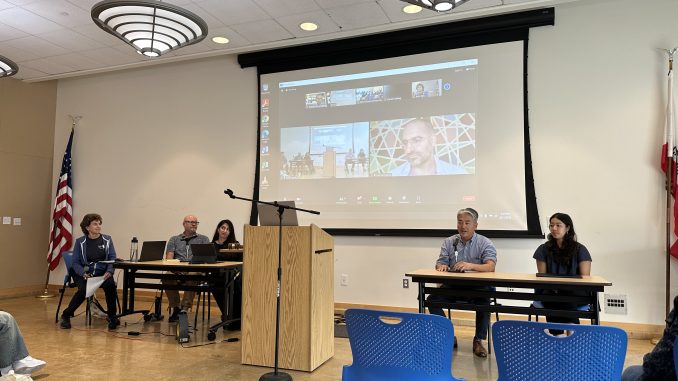
By Nancie Silver —
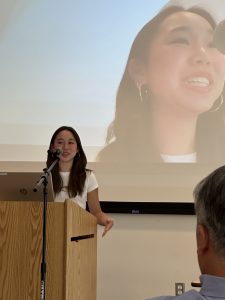 The Palos Verdes Democrats met in person at the Peninsula Main Library and on Zoom. First, Ann introduced the PV Students Environmental Advocacy group (SEA) and their spokesperson, Reina Jo, to hear about what they have been doing to encourage student activism, to grow their organization, and to register/pre-register students to vote.
The Palos Verdes Democrats met in person at the Peninsula Main Library and on Zoom. First, Ann introduced the PV Students Environmental Advocacy group (SEA) and their spokesperson, Reina Jo, to hear about what they have been doing to encourage student activism, to grow their organization, and to register/pre-register students to vote.
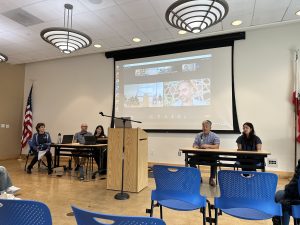 The main presentation focused on what is happening in the PVPUSD school district and featured four speakers:
The main presentation focused on what is happening in the PVPUSD school district and featured four speakers:
- Dr. Sara Deen, PVPUSD Board Member, elected to a four-year term in 2022, and President of the South Coast Interfaith Council
- Al Muratsuchi, Assemblymember and Chair of the Education Committee, and advocate for our schools
- Dr. Tim Coleman, President of the Palos Verdes Faculty Association, and a Peninsula High School teacher; Tim held a fabulous TEDx talk at PENHS five years ago, titled If You Can Do, Teach, to inspire his students and encourage more to go into teaching
- Paul DiCarmine, Founder of a Facebook group called Reasonable Parents of Palos Verdes. Paul had Covid so he joined via Zoom. Paul talked to us in May about how he got ‘Activated’ to create Reasonable Parents, a non-partisan, grassroots group of PV parents, teachers, and school staff collaborating to ensure that PVPUSD policies are evidence-based and grounded in objective truth and reason.
Unfortunately, Palos Verdes Estates Mayor Jim Roos was unable to join us via Zoom because he had Covid and wasn’t feeling well.
Sara Deen clarified that she was speaking as an individual and not as a representative of the school board. She began with her personal story and highlighted the importance of all children having access to an equitable and excellent quality public education. She believes two pressing issues we currently have in public education are negative partisanship and political polarization, both of which are distracting us from the very real and important issues facing public education. Education budgets are constrained, the student population is increasingly diverse, and student starting points vary. Important issues include the need for increased investment in public education funding, more special education funding for teacher shortages, and passage of a school bond to upgrade school facilities. Sara encouraged us to stop focusing on Critical Race Theory (CRT) and Trans students. She asked us to “continue to be the party that welcomes everyone because of our shared values and democracy and First Amendment and inclusion”.
Al Muratsuchi said he welcomed discussion about the issues facing public education, and said he personally knows the power of education to change lives. He wants every child to have the same kind of opportunities he has had. Al is concerned that instead of focusing on learning loss resulting from the pandemic, teacher and school employee shortages, and the ongoing student mental health crisis, school districts have had to deal with the culture wars revolving around LGBTQ+ students and book banning. He cited several school districts that have instituted discriminatory policies that are a violation of the FAIR Act, rather than focusing on meeting student academic, social and emotional student needs. He agreed that discussions about age-appropriate materials is valid but reminded us that public schools need to be inclusive for all students. [Editor’s note: When the FAIR (Fair, Accurate, Inclusive and Respectful) Education Act SB 48, was passed in 2011, it added LGBT people and people with disabilities to the list of groups that must be represented in history and social science texts. The purpose of the act was based on a study by California Safe Schools Coalition showing that inclusion of LGBT people in instructional materials is linked to greater student safety at school for both straight and gay students and lower rates of bullying.]
Tim Coleman spoke about the superior level of public education and facilities compared to when he went to school, his concerns about the increased funding of school choice taking money from public schools, and the PVFA union. Check out the TEDx talk he held at PENHS five years ago, titled If You Can Do, Teach, to inspire his students and encourage more to go into teaching.
Paul Carmine spoke about the founding of the Facebook group Reasonable Parents of Palos Verdes. He reiterated that he is not a president of the group, it is non-partisan, and he is neither a Democrat nor a Republican. He shared recent Reasonable Parents of Palos Verdes discussions about the selection process of the new PVPUSD superintendent. He commented on the problems and dangers of the culture wars, and said it feeds on division, fear, and misinformation that can be fought against by ‘active transparency’. Paul thinks most parents care about student mental health, school facilities, student safety, academics, representation, disaster readiness, and gun violence. He thinks we ought to focus on ensuring the two school board seats up for re-election are filled with reasonable people.
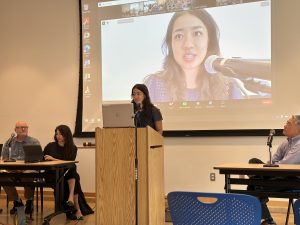 Next, Ann introduced a surprise speaker. Sydney Iravanchy is a Peninsula High School Student and PVPUSD student board member. She said the top three student concerns were outdated school facilities, mental health, and college and the future. These results were supported by data from a recent student survey of both high schools. Sydney proposed several creative solutions to address these student concerns, and thanked Al Muratsuchi, Tim Coleman, and others in the school district for their support.
Next, Ann introduced a surprise speaker. Sydney Iravanchy is a Peninsula High School Student and PVPUSD student board member. She said the top three student concerns were outdated school facilities, mental health, and college and the future. These results were supported by data from a recent student survey of both high schools. Sydney proposed several creative solutions to address these student concerns, and thanked Al Muratsuchi, Tim Coleman, and others in the school district for their support.
During the Question & Answer part of the meeting, many topics were discussed. Watch the video to hear all the questions and answers discussed by the panel. Here are a few highlights.
Al Muratsuchi clarified how public education is funded. In 2013, the Local Control Funding Formula (LCFF) was passed, with the goal of improving the outcomes of low-income students, English language learners, and foster youth. This is how the LCFF works: School districts all get the same base grant; districts with the highest percentage of students in one or more of these three categories get a supplemental grant, and districts with more than 55% of students in any of those categories get an additional concentration grant. PVPUSD doesn’t get the additional funding that LAUSD or Torrance receive because the PV district has fewer students in these three categories. Studies have shown a strong correlation between highest performing schools and wealthier areas. PVPUSD relies on additional fundraising from the Peninsula Education Foundation (PEF), which raises about $2,000,000 per year.
Al also spoke about three education bills he is supporting. SB 394 Master Plan for Healthy, Sustainable, and Climate-Resilient Schools will address the issue of climate readiness and extreme heat at some schools. SB 596 School employees: protection will address the harassment some teachers and other school employees have experienced due to the culture wars. AB 1078 Instructional materials and curriculum: diversity will address the proposed banning of books and other educational materials.
Al also discussed the issue of facility improvements, which are not funded through the general fund, but through bond measures. He encouraged all voters to support the next school bond; this is very important because if a school bond passes, the state will match the amount of the bond.
Sara talked about the need for more guidance from the state about book selection policy. In tackling this issue, she said many stakeholders need to come together to ensure a positive outcome for parents, teachers, and students. Creation of the policy will be an open process and will need to address the issues of developmentally appropriate materials and diversity of perspectives.
Tim said that students are affected by the culture wars, and he encouraged parents and school members to talk to each other is a respectful way. Sydney shared that most students are respectful of each other.
Al said he is working on a $14 billion dollar Facilities school bond measure for next year’s ballot; he said the Palos Verdes voters need to pass a school bond so that the district can access state matching funds to address the deteriorating condition of the school facilities. All the other panelists spoke in support of the school bond measure.
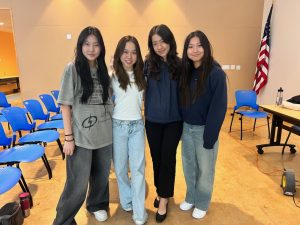 The PV SEA students and Sydney Iravanchy posed for a photo at the end of the meeting.
The PV SEA students and Sydney Iravanchy posed for a photo at the end of the meeting.
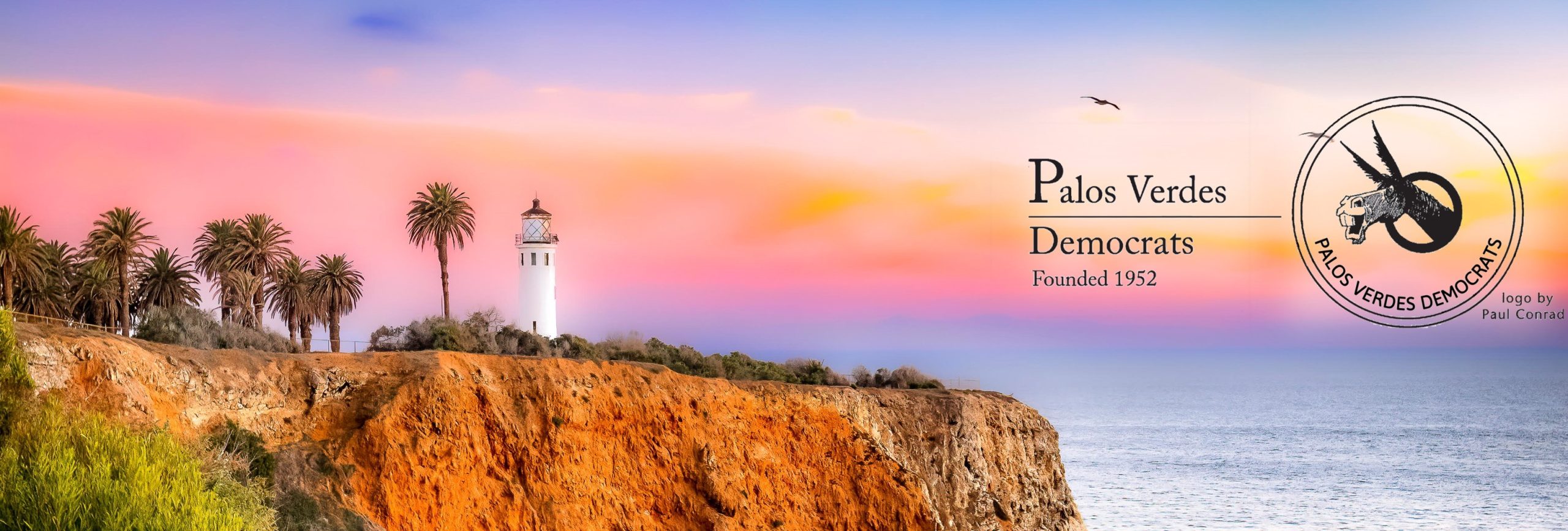
Leave a Reply